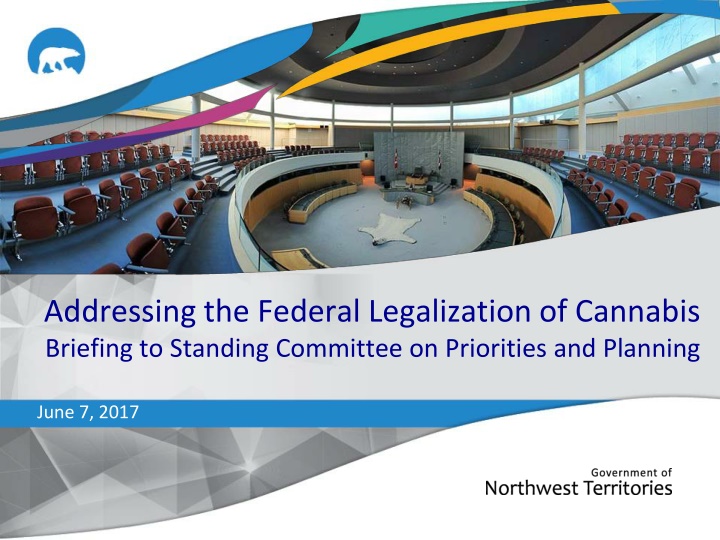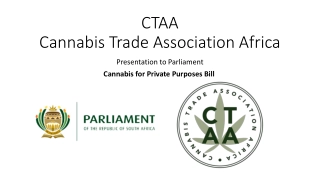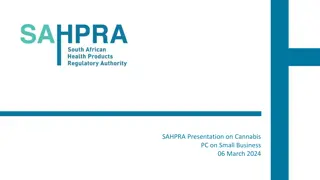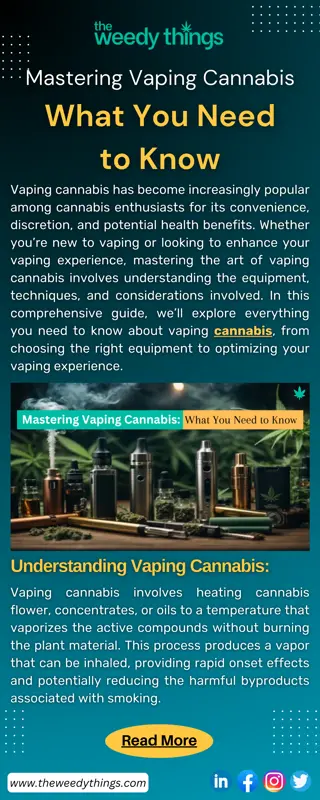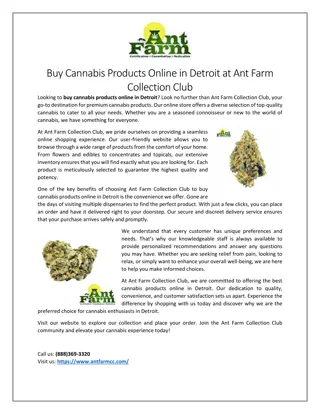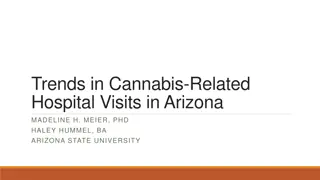Federal Cannabis Legalization: Overview and Principles
The briefing outlines the proposed Federal Cannabis Act, focusing on criminal framework, licensing, oversight, and health standards. It also discusses the principles guiding the regulation of cannabis sale and use in the context of protecting youth, controlling public health risks, and ensuring safe access for adults.
Download Presentation

Please find below an Image/Link to download the presentation.
The content on the website is provided AS IS for your information and personal use only. It may not be sold, licensed, or shared on other websites without obtaining consent from the author.If you encounter any issues during the download, it is possible that the publisher has removed the file from their server.
You are allowed to download the files provided on this website for personal or commercial use, subject to the condition that they are used lawfully. All files are the property of their respective owners.
The content on the website is provided AS IS for your information and personal use only. It may not be sold, licensed, or shared on other websites without obtaining consent from the author.
E N D
Presentation Transcript
Addressing the Federal Legalization of Cannabis Briefing to Standing Committee on Priorities and Planning June 7, 2017
Proposed Federal Cannabis Act The proposed federal Cannabis Act would: Set the general criminal framework for cannabis, identifying what activities are legal and what activities remain prohibited; Provide for the licensing and oversight of a legal cannabis supply chain that: Gives the federal Minister of Health the authority to license production, import/export and sale; Recognizes provincial and territorial authorization of sale of cannabis. Set federal regulatory standards to protect public health and public safety. 2
Proposed Federal Cannabis Act Part 4 General Authorizations Part 4 sets out minimum federal health and safety standards to be included in provincial and territorial legislation for authorizing distribution and sale: authorized persons may sell only cannabis that has been produced by a person authorized by the federal government to produce for commercial purposes; authorized persons may not sell cannabis to individuals under the age of 18 years; authorized persons must keep appropriate records in relation to the cannabis obtained by them for commercial purposes; and authorized persons must take adequate measures to reduce the risk of diversion of cannabis to an illicit market or use. Federal distribution rules for direct mail order (likely Internet based) would apply in NWT if GNWT is unable to enact legislation authorizing distribution and sale in the NWT before implementation of federal Cannabis Act. 3
Principles The GNWT is committed to regulating cannabis sale and use so as to: restrict youth access to cannabis, and protect young people from promotion or enticements to use cannabis; allow adults to possess and access regulated, quality controlled legal cannabis; discourage drug-impaired driving; protect workers and the public from drug-impairment in the workplace; protect public health by controlling the public smoking of cannabis; enhance public awareness of the health risks associated with cannabis; provide a safe and secure retail regime for the adult purchase of cannabis; provide for local options to establish cannabis distribution and consumption restrictions and prohibitions. 4
Key Issues and Considerations Many NWT residents struggle with addictions and a legal source of cannabis could lead to increased use, especially among youth, and contribute to the social problems associated with addiction. Does the GNWT want to place further restrictions beyond the federal minimum standards? Examples are: increase age of use from 18 to 19 years to match NWT minimum age for liquor consumption, decrease the amount that can be possessed in a public space below the 30 gram limit, and reduce number of plants allowed from 4 per household. Tightening the rules beyond the federal standards may seem restrictive and further the problem of otherwise law-abiding citizens disregarding the law and/or increasing the government obligations/requirements for enforcement. 5
Key Issues and Considerations continued How does the GNWT want to regulate distribution and sales? How should concerns about dangerous co-use of alcohol and cannabis be addressed? Can these concerns be mitigated through education and banning cross promotion, or is it necessary to require consumers to purchase alcohol and cannabis in separate transactions? Some communities will want the ability to establish local cannabis restrictions or prohibition. Self-government agreements may require clarification of what jurisdiction is to be extended over cannabis. A negotiating mandate will need to be developed on this subject. Is it advantageous for the NWT approach to drug-impaired driving, workplace safety, and the public smoking of cannabis, to be consistent with approaches taken across Canada? 6
Distribution and Taxation Options Potential approaches include: Liquor Commission model sales controlled by a government entity and taxation linked to mark-ups to a retail price consistent with other jurisdictions. In the locations where there is a store, the consumer would purchase in person. Shipments to outlying communities would be similar to the mail order or air delivery system used by the Liquor Commission for liquor. Provides the greatest ability for community involvement in restricting cannabis use. Tobacco model sales restricted to licenced retail outlets, tax applied to retail sales but collected at the wholesale/distributor level. Would permit a coordinated approach with other jurisdictions for taxing cannabis. Do nothing federal model of direct mail and internet sales will apply similar to current federal medical marijuana system. Difficult to include controls for restricting sales to minors and no opportunity for NWT tax revenue. 7
Next Steps Public and stakeholder engagement on the proposed principles for guiding the GNWT s approach to cannabis: Internet-based dialogue with information on key issues and questions to guide discussion; Public and stakeholders invited to submit written views about proposed principles; Public meetings in 7 regional centres and 2 representative small communities in September; and Initial engagement ending in late September, with What We Heard report prepared shortly after engagement activities are completed. Principles for GNWT s approach to cannabis reflecting key themes heard during the public engagement finalized in late September. October legislative proposals introduced. 8
Milestones What When Federal legislation introduced April 13, 2017 Public engagement on principles June September 2017 Legislative proposal(s) October 2017 Introduction of legislation by Ministers of Finance, Infrastructure, Health and Social Services February 2018 Cannabis related legislation passed June 2018 Implementation On or shortly before July 1, 2018 9
